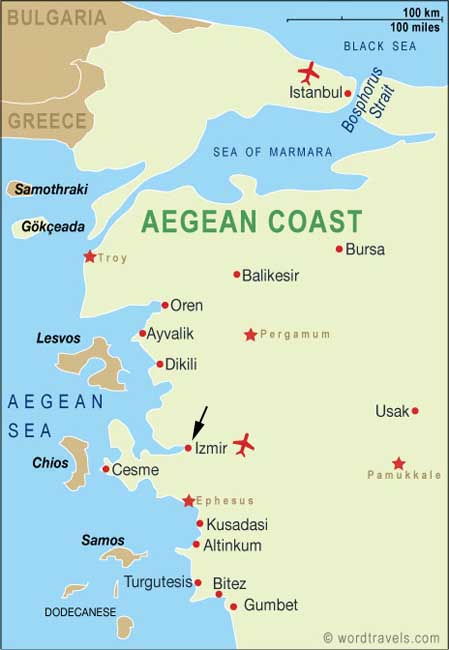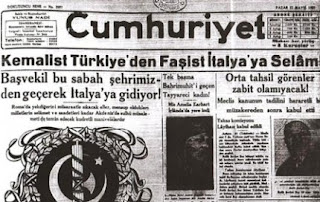Turkiye ready to take first ride on landmark undersea train line
28 October 2013 /TODAYSZAMAN.COM, İSTANBUL
From Tuesday onward, Oct. 29 will not only be commemorated as the anniversary of the founding of the Turkish Republic, but the day a giant transportation project, the Marmaray, connecting İstanbul's Asian and European sides via an undersea commuter train line, was inaugurated, fulfilling an Ottoman sultan's dream from 153 years ago.
The project aims to ease İstanbul's heavy traffic and reduce travel time between the two sides of the Bosporus to four minutes. Marmaray, the world's first undersea tunnel connecting two continents, will carry 75,000 passengers per hour and around 1 million passengers per day.
On Tuesday, a 13.6-kilometer section of the 76.3-kilometer project is being launched. Until the project is completed, the Marmaray will run from Ayrılıkçeşme on the Anatolian side to Kazlıçeşme on the European side. A ride on the line will cost TL 1.95.
After numerous test runs of the Marmaray tube were conducted, officials announced that İstanbulites will be able to start using the service on Tuesday.
The Marmaray line connects the Sirkeci and Haydarpaşa commuter train lines with an undersea tunnel beneath the Bosporus Strait. The complete line will consist of three underground stations in İstanbul's Yenikapı, Sirkeci and Üsküdar districts and 36 above-ground stations. The Ayrılıkçeşme station will serve as a transfer station for the Kadıköy-Kartal subway line.
Speaking at the International Silk Road Conference in İstanbul on Monday, Transportation, Maritime Affairs and Communications Minister Binali Yıldırım said the Marmaray is more than just a Turkish project to improve public transportation in İstanbul, but part of the Silk Road, which has served humanity for centuries, connecting Asia and Europe.
“This is a project of reuniting civilizations. The Silk Road is not only a caravan route but a road that links Western and Eastern civilizations,” he said.
Before Tuesday's landmark opening, the project was presented to journalists on Sunday by municipal officials. Yıldırım was scheduled to have dinner on Monday with representatives of the company that built the Marmaray and workers who took part in the construction of the tunnel.
Japanese Prime Minister Shinzo Abe arrived in İstanbul on Monday to take part in the Marmaray's inauguration, where Turkish President Abdullah Gül and Prime Minister Recep Tayyip Erdoğan will also be in attendance along with many other top state officials.
In an attempt to ensure more effective use of the line and integrate the Marmaray into the city's public transportation system, the İstanbul Metropolitan Municipality has launched new bus lines to bring passengers to the Ayrılıkçeşme, Üsküdar, Sirkeci, Yenikapı and Kazlıçeşme stations.
On Monday, British daily The Times announced the opening of the Marmaray, saying that the “tunnel is the linchpin in what has been dubbed an 'Iron Silk Road' linking Europe and Central Asia.”
The first test run of the project took place with a ceremony attended by Yıldırım and Erdoğan in August. A train was brought to the Zeytinburnu district's Kazlıçeşme neighborhood on the European side. The train then traveled to the Ayrılıkçeşme stop. Erdoğan and Yıldırım were among the first passengers to travel in the Marmaray tunnel.
Speaking before the August test run, Erdoğan said it would take just four minutes to cross from the European and to the Asian side of İstanbul thanks to the project, adding: “This project is not the project of the century, but the project of centuries. … We, as the government, have made a 150-year dream a reality. We don't only make promises; we also achieve them. We are solving the transportation problems across Turkey with numerous underground projects.”
The foundations were laid for the Marmaray line by Prime Minister Erdoğan on May 9, 2004, and construction has been carried out by the General Directorate of Railroads, Ports and Airports Construction (DLH); Japanese contractor Taisei Corporation; Turkish firm Gama-Nurol; and the Avrasya Consult firm. The project includes 13.6 kilometers of tubing, 1.4 kilometers of which is underwater. The 36-station line will provide travel between the European and Asian sides of İstanbul in just four minutes and, with high connectivity, allow seamless transfers to other forms of transportation throughout the city, including lines that connect to the airports. The undersea rail system will connect with the suburban Gebze-Söğütlüçeşme and Halkalı-Kazlıçeşme lines. In addition to İstanbul's metro line, Marmaray will link to the İstanbul-Ankara high speed train line.
Travel time between Gebze and Halkalı is expected to take 105 minutes, between Bostancı and Bakırköy 37 minutes and between Söğütlüçeşme and Yenikapı12 minutes.
Safety concerns
The launch of Marmaray has sparked a debate about the safety of the tube project and its earthquake readiness as İstanbul lies on major fault lines.
During his meeting with journalists on Sunday, Minister Yıldırım downplayed the concerns about Marmaray's safety, saying that all measures have been taken to prevent safety problems. He added that there are skyscrapers in Kozyatağı and Bostancı that face a greater risk than Marmaray in case of an earthquake.
However, opposition parties raised some allegations on Monday with regards to Marmaray's safety and said the project was launched hastily, before its shortcomings could be worked out.
A deputy chairman of the Republican People's Party (CHP), Umut Oran, carried his party's claims about Marmaray to Parliament's agenda to be addressed by Prime Minister Erdoğan.
Oran asked Erdoğan many questions concerning Marmaray's safety, such as whether it is true that one of the locomotives running in the Marmaray tube was damaged during a test run attended by the transportation minister, Turkish State Railways (TCDD) general manager and high-ranking ministry bureaucrats on Oct. 25; whether the minister and bureaucrats were stuck in the locomotive for an hour; and whether there have been some collapses in some parts of the Marmaray tunnels that were ignored so the line's inauguration could go ahead on Oct. 29 in compliance with the orders of Erdoğan, who will be responsible for any accidents that happen because the line was opened prematurely.
The Nationalist Movement Party (MHP) also voiced concerns about Marmaray in a motion submitted to Parliament by the party's Kocaeli deputy, Lütfü Türkkan. Türkkan asked Yıldırım to respond such questions as why the project has been launched section by section instead of all at once and whether this could lead to accidents due to possible signaling errors.
He claimed that the government has launched the project prematurely in order to capitalize on it in the upcoming local elections.
Project's completion delayed due to archaeological findings
The expected completion date for the Marmaray project was pushed back four-and-a-half years due to archaeological findings during excavations.
A Cabinet decision that included an update to the cost of the Marmaray project was published in the Official Gazette on Dec. 17, 2009. Pursuant to the Cabinet decision, the undersea tube's completion date was postponed from April 2009 to Oct. 28, 2013, with archaeological digs cited as the reason for the delay. The Cabinet said that the project's completion date had to be extended because of the findings and the non-standard nature of the tube's construction, noting that nothing could be done to prevent the lengthy delay. The delays cost four-and-a-half years and at least $500 million.
The excavation work for the public transportation project was monitored by archaeologists from İstanbul Archaeological Museums. Various artifacts were found, including human skeletons, church ruins, water wells, fossilized footprints and sherds from nearly a million earthenware pots and plates. One of the most outstanding historical artifacts unearthed is the fourth-century Port of Theodosius from the Byzantine era. Moreover, 36 sunken ships -- 30 of which were merchant vessels equipped with sails and five of which were galleys propelled by rowers -- that sank between the fifth and 11th centuries were also been located. All of the pieces will be classified and, if possible, broken artifacts will be restored. Some 40,000 historical items that will help to reveal the ancient history of İstanbul were discovered by 500 laborers and 60 experts.
In the meantime, test runs began in İstanbul on Monday for another transportation project, the Haliç Metro Bridge, which is also expected to ease the city's heavy traffic. The bridge, which will accommodate a new metro line, will be used by around one million people a day and will enter into service in January 2014.
What does Prime Minister Abe's visit to Turkey mean?
by Sasaki Yoshiaki
28 October 2013 /
Japanese Prime Minister Shinzo Abe has been holding historic visits after coming to office for the second time. We could say that Abe, who has been pursuing a more active foreign policy compared to his predecessors, is working hard to ensure that Japanese diplomacy becomes more influential.
It seems that the reason for this ambition in Japanese diplomacy is the stagnation in the world economy and unpromising relations with Western countries. The government shutdown in the US, which raised concerns among world economic circles, is still fresh in memories.
Stagnation in the economy leads to change in a country's security approach. In an attempt to address domestic opposition and dissatisfaction because of economic slowdown, states generally tend to create an image of an external enemy so that national solidarity is achieved and economic deterioration is forgotten. In this way, the public policies work for some time, but in the end, things get even worse.
We may argue that economic reasons have encouraged the prime minister to look for new friends abroad and to maintain close relations with these new friends. Turkey is of course one of the countries that seems to be a rising star in its region and achieving visible economic development. Otherwise, a second visit within the same year to Turkey would not have happened.
We see that Turkey also trusts Japan. If this had not been the case, it would not have preferred Japan to build a nuclear plant in Sinop. Construction of the nuclear energy plant means a strong bond between the two countries because without mutual trust and confidence, it would not become possible to share high-security nuclear technology. We are talking about a project that would remain in place for 40-50 years; it cannot be interrupted by some sporadic and temporary disagreements. Therefore, before a plant, long-term friendship and trust should be constructed first between two countries.
It is obvious that Turkey prefers Japan because of its financial strength and high technology. Japan, on the other hand, picks Turkey as potential partner for the following reasons:
First, Japan believes that Turkey will be able to learn the applications of this technology and employ it for the good of the people. Otherwise, Japan would not have considered exporting nuclear plant technology to Turkey. Second, the Japanese authorities uphold that Turkey may be a good strategic partner. Despite the fact that Turkey and Japan are geographically distant, there are many resemblances and similarities in different fields between the two countries. I suppose that the Turkish people have witnessed one of these similarities during Prime Minister Junichiro Koizumi's visit to Turkey in 2006. Kouizumi bent his knees in a mosque he visited. This means that Japanese people, like the Turkish people, bend their knees in respected and sacred places and in front of people they care about most.
There are also linguistic similarities between the two countries and nations; the Turkish and Japanese languages can be considered grammatical twins. This means that the patterns of thinking of the two peoples are also the same. The Japanese and the Turks employ a similar approach towards the world and express their views in regards to what they observe. For this reason, Turkish is one of the foreign languages that the Japanese learn fast.
Many ministers, bureaucrats and politicians as well as people are aware of these similarities and resemblances. For this reason, nobody expressed opposition to Prime Minister Abe's attempts to strengthen ties with Turkey. In addition, the Japanese know that Turkey extends support and aid to people in Arab countries, Central Asia and Africa and that it attracts interest and respect in these regions. We may argue that this image of Turkey impresses Japan as well.
Likewise, Japan is making efforts to ensure the development of its neighboring nations in East Asia. Japan, through cooperation with Turkey, may establish permanent relations and ties with Arab countries and Central Asian states. Turkey has a special place in the Central Asian region. From this perspective, Turkey may lead to Japan to achieve a bright future in cooperation.
Japanese companies have been working together with Turkish corporations in Central Asia for a while. Japanese companies are improving their businesses with the support of their Turkish partners. Of course, this will continue in the future as well. Because he is aware of this, Prime Minister Abe holds no doubt vis-à-vis Turkey. For this reason, he wants to pay a visit to Turkey for the second time within a year.
Unlike relations between Turkey and the West, there is no historical background in the relations between Turkey and Japan. But the historical background between Turkey and the West is full of bad memories. On the contrary, Turkey and Japan have good relations as two good friends who have just started to get to know each other. In a sign of friendship, Ottoman Sultan Abdulhamid II sent a warship to Japan, but the Ertuğrul sank in an unfortunate incident. However, this tragic event also offered a good opportunity for the Japanese people to remember the friendship of the Turkish people. The local people of the place where the vessel sank buried the victims in their own village, took care of the wounded and initiated nationwide campaigns. They subsequently sent the money they collected to Turkey for distribution to the relatives of the victims.
Then it was Turkey's turn to extend help. By the time a war started between Iran and Iraq, President Turgut Özal sent a Turkish Airlines aircraft to rescue the Japanese who were trapped in the warzone. The Japanese asked the pilot about how he felt after the incident; he told them he did his job as a human being. This attitude, which reflects altruism, is precious for the Japanese people. Not only the pilots, but also the cabin crew held similar sentiments. This means that altruism is a national characteristic of the Turkish people. I personally would like to offer my thanks to these people.
This characteristic is particularly important in dangerous environments. Nuclear energy could lead to dangerous outcomes. In such cases, we need altruistic and brave people. Because we have witnessed that there are many Turkish people holding these characteristics in history, for this reason, Prime Minister Abe and the other Japanese authorities did not hesitate to transfer nuclear technology to the Turks.
If the seed is good, the crop will also be good, even if it takes time. It appears that mutual friendship is the main basis of the relationship between Turkey and Japan. The product will always be good no matter how much time passes by. I hope that the mutual respect between the two nations will survive forever.
 Buy on AliExpress.com
Buy on AliExpress.com
 Buy on AliExpress.com
Buy on AliExpress.com






